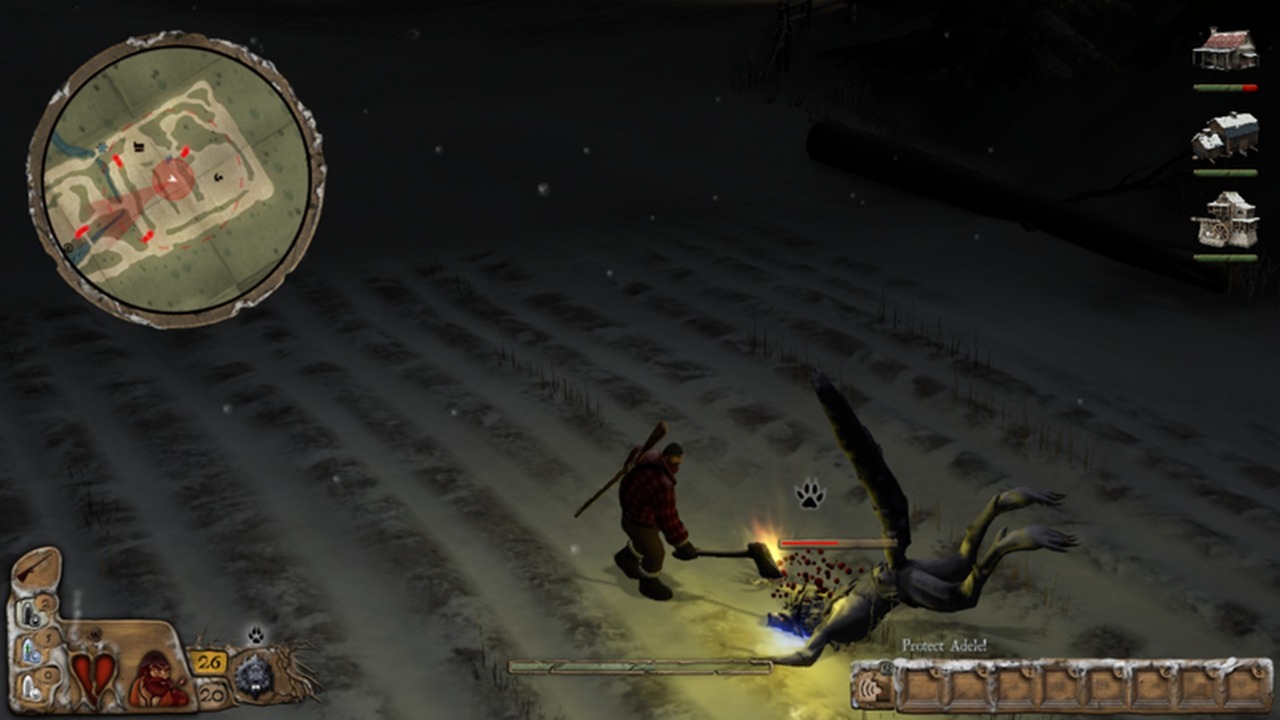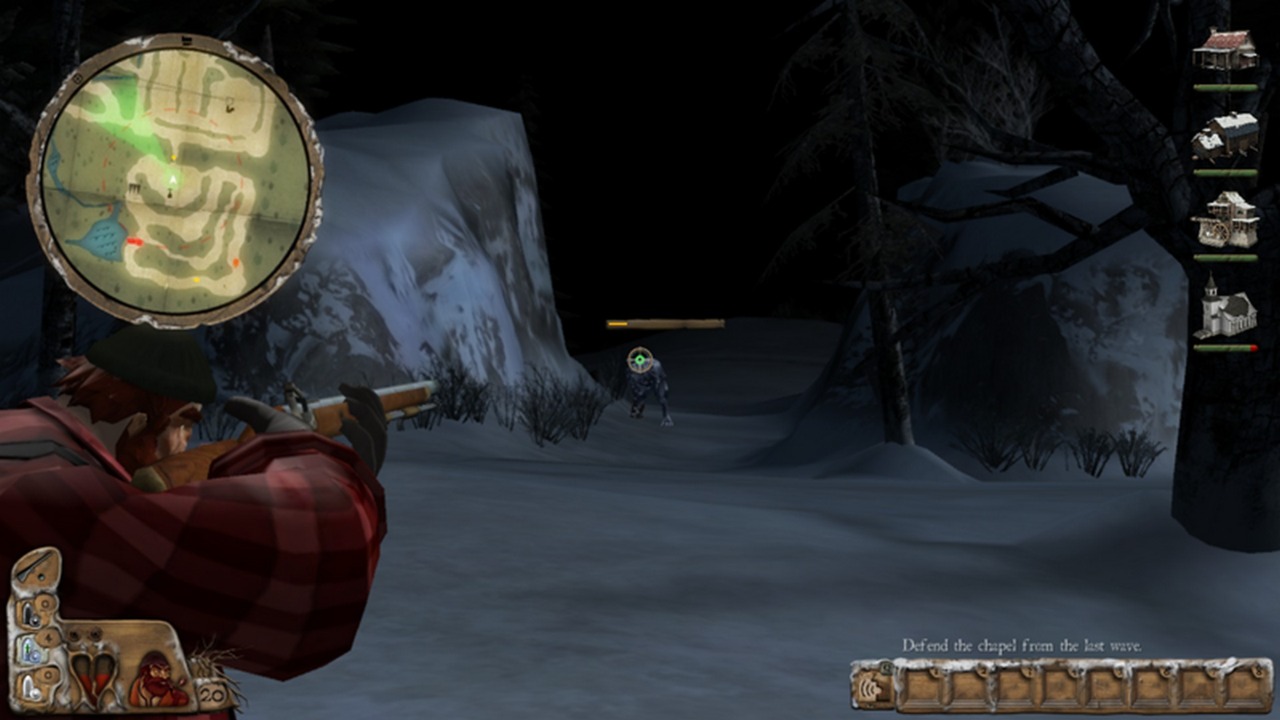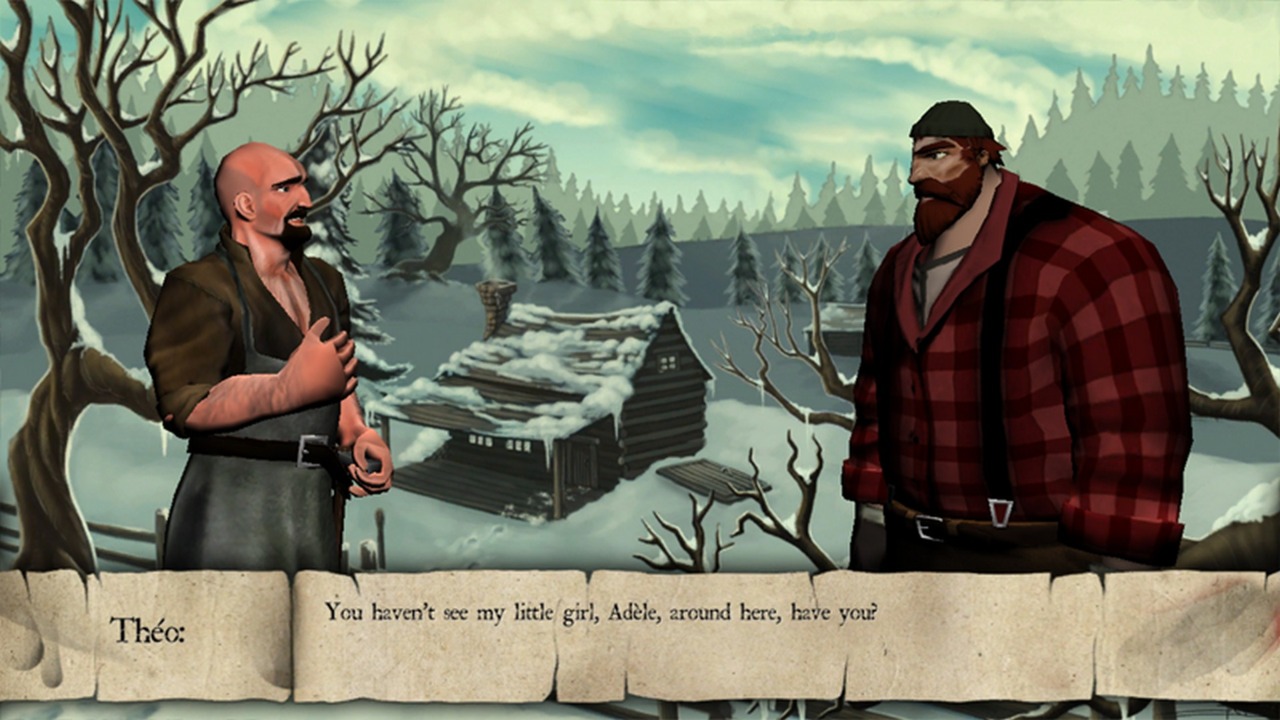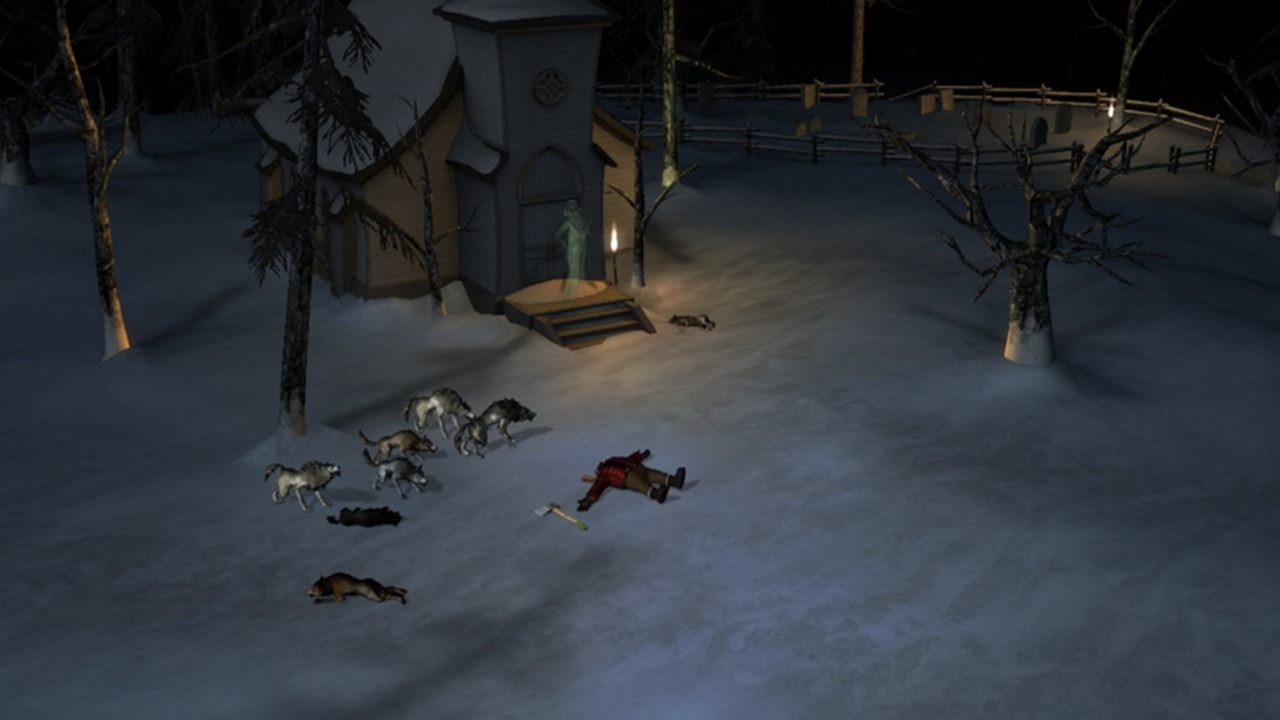When you're in the remote wilderness of werewolf country, hunkering down and chopping up all manner of horrific beasts night after night doesn't seem like the smartest alternative to simply running like hell, but Canadian lumberjack brothers Jacques and Joseph are made of tougher, more stubborn stock. Their quest to save their sister from the demonic fanged beings of the night in Sang-Froid: Tales of Werewolves requires careful planning during the daylight hours and precise execution when the sun goes down. All of the neat ideas at play in this distinct tower defense/third-person brawler hybrid ultimately keep the rough edges at bay long enough to let the cyclical blend of strategizing and action take hold.

Set in the dark, wintry forests of Canada, Sang-Froid revolves around an ill-fated region beset by all manner of lupine kinfolk. Even the devil himself has a hand in things. The aforementioned brothers begrudgingly band together in an effort to shore up their defenses as their seemingly possessed sister recovers from a supernatural ailment. Meanwhile, the forest's unruly and unholy creatures are growing in number and variety, adding ample diversity to the nightly attacks on your meager fortifications. Throw in some shamanism, a touch of Native American mojo, and some good old-fashioned woodsman's whisky, and you've got a wild ride. It's a great setup in a fresh, original setting.
Unfortunately, some of that excellent vibe is sapped by weak production. The awkward story dialogue sequences are horribly slapdash looking, though decently voiced, and the overall visual quality falls short both in-game and during cutscenes. Things don't get much better in battle, either, which frequently plays out across dimly lit, sparsely detailed snowfields surrounded by woods. Despite its promising setting, Sang-Froid is a rather ugly beast at times on the visual front.
Looks aren't everything, of course, and an abundance of thoughtful gameplay nuances do help ease some of the game's less visually stunning moments. Sang-Froid's tower defense strategizing hinges on keeping the scattered structures under your control from getting razed by the local demonic nightlife. The fact that each round is divided into two different phases helps keep things interesting. Foes attack in waves from different points on the map, and the daytime portion of each stage has you spending from your accumulated cash and a limited pool of action points to lay down traps in an effort to railroad and stamp out your foes before they rip your home to shreds.

All of this happens on a top-down map screen that gives you lots of control over how you plan out your defenses before locking into a specific arrangement. Once they appear, creatures follow a set route to their target building unless they're diverted or rerouted. Laying down crushing traps, spiked strips, flame barriers, unholy wards, fast-travel zip-lines, and other defensive elements provides a diverse means to strategize prior to the actual assault. It's cool that you can take different approaches to victory, though failure isn't entirely punitive, since you can start each level from scratch or resume your strategic tinkering right before nightfall to subtly tweak your plans.
Once you've locked in your plans, night falls, and it's time to get your hands dirty. Playing as the brother of your choice, depending on your selected difficulty level, you switch to third-person combat as you duke it out with werewolves, demons, and other freaky fare with the aid of your careful trap planning. If you plan well, your traps will do most of the heavy lifting, freeing you up to swoop in to finish the job or attend to any surprises that pop up. When you get down to it, it's disappointing that the actual combat is fairly rote. You run around swinging your equipped axe for close-range brawling or wield a reloadable single-shot musket to trigger traps or damage foes. However, it's the many minor but intriguing touches layered onto this basic foundation that make these battles still feel dynamic and exciting.

Almost every action you take consumes stamina, from sprinting to swinging your axe in combat. Running out of stamina completely in the middle of a fight can be deadly, since you have to wait for it to recharge before you can attack again. This forces you to pace yourself and think carefully about each move even as you're in the fray. A cool fear element ties directly in to this mechanic and gives battles a certain rhythm that ebbs and flows throughout each encounter.
What is this element of fear? Well, both you and your enemies have a fear meter that constantly shifts as you play. Shouting, killing enemies, and lighting bonfires temporarily increases your fear factor. Weaker foes can still be deadly when they're in large packs, but they won't lunge at you right away if you can intimidate them enough. This gives you crucial time to reload, recharge your stamina, and prepare for the next charge as your foes circle around you menacingly. Other neat considerations, like factoring in the wind direction to mask your scent, creatures' immunities to non-silver weapons, and the unique properties of each foe you face, really dress up combat encounters enough to make them fun.
Between moments of meticulous daytime strategizing and the intense nocturnal fights, Sang-Froid's progression system is the glue that keeps it all together. As you gain experience, you can access character upgrades on a beefy skill tree that boost your survival skills across assorted disciplines. Visiting the town lets you bless your weapons, buy new gear, stock up on supplies, and grab some inebriating power-ups at the local tavern. While killing foes earns you cash, spending unwanted action points during the strategy round to harvest lumber gives a little extra incentive to use your traps efficiently. There's a lot to juggle between each facet of gameplay, but they're cohesively entwined and complementary. While some aspects of the presentation aren't that sharp, the stylish menus do play into the old-timey "horror in the Canadian woods" theme rather nicely.
Sang-Froid has a ton of dark, quirky personality that masks some of its flaws. It has a few warts that mar its visual design in spots, and the core combat is too rocky to always satisfy. But the overall cycle of planning out and then executing each day's defenses against increasingly strenuous unholy assaults is undeniably fun. And just when it seems like the game is about to even out into a repetitive groove, it throws some new funky wrinkle into the formula to shake things up. Issues aside, this inventive, supernatural mash-up is absolutely worth possessing--demonically or otherwise.
